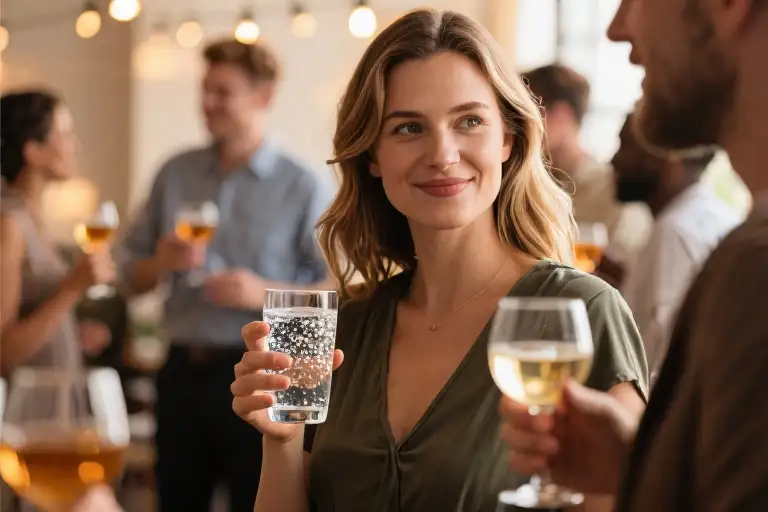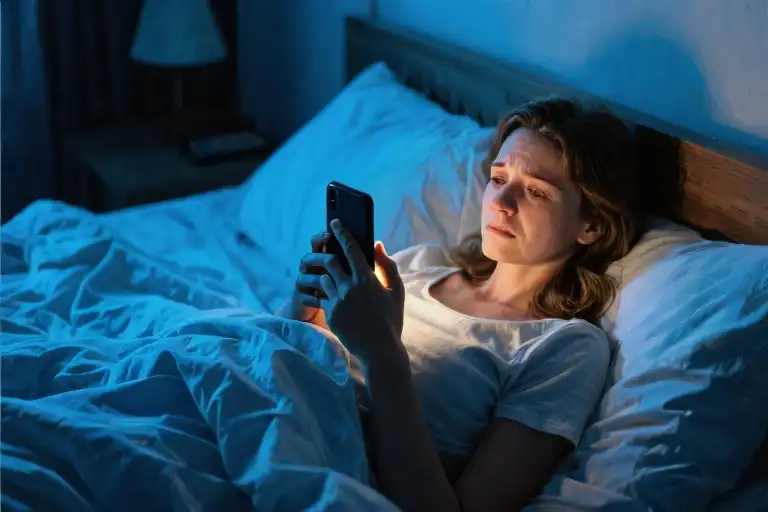The first thing you notice isn’t the weight loss or the extra money in your bank account. It’s the way people’s eyebrows lift when you decline that third round of cocktails—a microexpression somewhere between confusion and betrayal. Me at a wedding in 2022 versus 2023 tells the story better than any health metric: in one photo, I’m flushed and grinning with a champagne flute; in the other, perfectly sober and acutely aware of how many guests keep glancing at my soda water.
Let’s rip the bandaid off now: quitting alcohol means losing friends. Not the dramatic, tearful kind of loss—more like watching your social circle quietly recalibrate until Tuesday trivia nights stop appearing in your calendar. When Andrew Huberman’s podcast on alcohol’s neurological effects coincided with my 30th birthday (that magical age when societal expectations start feeling optional), I expected better sleep and clearer skin. Nobody warned me about the awkward silences at dinner parties when you’re the only one not reaching for wine.
Here’s what they don’t tell you in those glowing ‘life after alcohol’ testimonials: sobriety forces everyone around you to confront their own drinking habits. Your decision becomes a mirror reflecting behaviors they’ve never questioned—which explains why ‘I’m doing Dry January’ gets nods of approval while ‘I don’t drink anymore’ triggers defensive jokes about needing liquid courage. The irony? You’re not judging them; they’re judging themselves through your choices.
The real transformation happens around month three, when you realize those ‘deep connections’ at the bar were actually just alcohol-fueled illusions of intimacy. My London social circle shrank by 80% post-sobriety, not because I became boring (though let’s be honest—karaoke is objectively terrifying without tequila), but because removing the social lubricant revealed how little we actually had in common. What remains are the two friends who’ll meet for museum dates instead of bottomless brunches, the ones who don’t need liquid permission to be emotionally available.
Sober curiosity isn’t just about rejecting hangovers—it’s about discovering who you are without the personality crutch we’ve collectively agreed is mandatory for adulthood. The trade-offs are brutal but illuminating: yes, you’ll yawn through late-night parties and panic during first dates without wine goggles. But you’ll also remember every meaningful conversation, wake up without shame spirals, and finally understand why your drunk self kept making the same mistakes. Alcohol exists because reality is hard; choosing to face it sober is the ultimate act of rebellion against our ‘collective poisoning’ culture.
The Social Gauntlet: What Really Happens When You Stop Drinking
That moment when you decline a drink at a party – the split-second pause, the raised eyebrows, the awkward readjustment of social dynamics. Welcome to the unspoken reality of sober living, where your personal choice becomes public property. This isn’t about health benefits or morning-after regrets; it’s about navigating the minefield of human reactions when you step off the collective drinking carousel.
The Four Reactions You’ll Inevitably Face
- The Inquisition
“Wait, you don’t drink at all? But why?”
This interrogation comes in waves – first genuine curiosity, then skeptical probing, finally uncomfortable silence. What drinkers really want to know: Are you judging me? Pro tip: Reverse the question (“Why do you drink?”) and watch the conversation evaporate faster than vodka in sunlight. - Permission Seeking
“Is it okay if I have this martini?”
The modern equivalent of medieval indulgence-buying. Their drink request isn’t about your approval – it’s their subconscious grappling with cognitive dissonance. Your sobriety holds up a mirror to their drinking habits, and frankly, most people would rather smash the mirror than examine their reflection. - The Judgment Projection
Sober you becomes their Rorschach test for insecurity. That time you quietly sipped sparkling water? Obviously you were mentally cataloging everyone’s drink counts. The truth: Most sober people are too busy managing their own social anxiety to judge yours. But try explaining that after someone’s third margarita. - Social Darwinism
The invites slow, then stop. Group chats go quiet. You’ve become the human equivalent of a fire alarm at a pyrotechnics convention – not wrong, just inconvenient. This isn’t personal (though it feels devastatingly so). Drinking culture operates on exclusion just as much as inclusion – the difference is no one admits the former.
Why Your Choice Feels Like a Threat
Alcohol functions as society’s silent contract – an unspoken agreement that we’ll all chemically alter ourselves to make human interaction bearable. When you break this contract:
- You expose the artifice: Sober conversations reveal how much alcohol lubricates social gears
- You challenge the default: Suddenly “everyone drinks” becomes “most people drink”
- You create accountability: Your presence makes others conscious of their unconscious drinking
This explains why “I’m driving” gets accepted while “I don’t drink” sparks debate. Temporary abstinence maintains the drinking paradigm; permanent sobriety challenges it.
Survival Tactics for the Sober Socialite
- The Misdirect
“I’m on medication” works until someone asks which one. Better yet: “My doctor said no” – vague enough to imply seriousness, medical enough to discourage follow-ups. - The Role Reversal
When asked why you don’t drink, respond with “Why do you?” Delivered with genuine curiosity (not judgment), this can spark fascinating conversations – or send them scrambling to the bar. - The Nuclear Option
For persistent pushers: “I’m pregnant” (regardless of gender). Works best when accompanied by intense eye contact. Bonus: Watch them mentally calculate whether to congratulate you or call an ambulance. - The Bartender Alliance
Befriend the person pouring drinks. A good bartender can make your soda water with lime look like a gin and tonic, sparing you the twentieth explanation of your life choices.
The uncomfortable truth? These strategies shouldn’t be necessary. But until society catches up with sober curiosity, consider them your linguistic armor against the slings and arrows of drinking culture.
The Great Friend Reckoning: When Sobriety Rewrites Your Social Circle
Let’s get straight to the uncomfortable truth they don’t mention in those glowing ‘I quit drinking’ testimonials: your address book will shrink faster than your wine budget. Not because you’ve become unbearable (though we’ll get to that possibility later), but because alcohol functions as social glue in ways we rarely acknowledge until we stop consuming it.
The Great Divide: Adaptors vs. Pressure Cookers
Your social circle will inevitably split into two distinct factions within months of going sober. The first group – let’s call them The Adaptors – will seamlessly transition to morning coffees, hiking trips, or that radical concept called ‘having conversations while fully conscious.’ These are the keepers.
The second group, The Pressure Cookers, operate differently. Some will pepper you with ‘just one drink won’t hurt’ suggestions until you dread seeing their contact pop up on your phone. Others will gradually stop inviting you altogether, not out of malice, but because your presence suddenly makes their Friday night ritual feel… examined. As one formerly close friend confessed over (her) third margarita: ‘It’s like having a vegetarian at a barbecue – nobody’s judging, but suddenly we’re all weirdly aware we’re chewing on carcasses.’
London Calling: A Case Study in Social Darwinism
My own sobriety experiment coincided with relocating from London to Berlin – a perfect natural experiment. Pre-quitting, my London social calendar resembled a tube map with intersecting circles of work drinks, book club wines, and ‘quick catch-up’ cocktails. Post-sobriety, that sprawling network distilled down to three people who’d meet for museum trips instead of bottomless brunches.
The uncomfortable revelation? Those dozen ‘close friends’ I thought I had were actually drinking buddies with excellent listening skills when lubricated. Without the ritual of clinking glasses, we discovered our conversational chemistry relied heavily on ethanol. As one formerly inseparable friend put it during an awkward sober lunch: ‘Turns out we mainly bonded over hating the same people – and that’s less fun when you’re not trashed.’
The Brutal Mirror of Morning Clarity
Here’s the sobering reality (pun intended): alcohol doesn’t just lower inhibitions – it creates artificial intimacy. Those 3am heart-to-hearts that felt so profound? The work venting sessions that seemed therapeutic? The holiday friendships that felt destined to last? Many evaporate under the harsh light of sobriety, leaving you to distinguish between alcohol-facilitated connections and genuine compatibility.
This isn’t necessarily tragic – it’s evolutionary. Just as teenagers outgrow playground friendships, adults eventually graduate from bonding over substances to connecting through shared values. The transition stings, but the relationships that survive become remarkably durable. My two remaining London friends and I now have inside jokes that don’t require hangovers to be funny – who’d have thought?
The Unexpected Upside of Social Pruning
While the initial friend attrition feels like social Siberia, there’s hidden value in this winnowing process. You’ll quickly identify:
- The Transactional Drinkers: Those who only socialize when alcohol is involved
- The Emotional Crumblers: Friends who rely on booze to access vulnerability
- The Activity-Challenged: People whose entire personality is ‘going out’
What emerges is a leaner, more authentic social network. The friends who remain will surprise you – that quiet colleague who suggests pottery classes, the gym buddy who organizes sober camping trips. These become your new foundation, proving that while alcohol might accelerate friendship formation, sobriety determines its tensile strength.
Survival Tips for the Socially Sober
- Host Alternative Gatherings: Game nights, escape rooms, or cooking parties provide natural structure
- Find Your Sober Wingmen: Every city has sober communities – mine was a running club that met at juice bars
- Reframe Rejections: When someone stops inviting you, it’s not personal – it’s their discomfort manifesting
- Embrace the Cull: Fewer but deeper connections beat dozens of liquor-laced acquaintances
Remember: the friends worth keeping will stick around not despite your sobriety, but because they appreciate who you are without it. The rest? Consider them social collateral in your journey toward authentic connection.
The Sober Mirror: Facing Your Unfiltered Self
That moment when the champagne bubbles stop fizzing in your glass is when the real revelation begins. Sobriety doesn’t just remove alcohol from your system – it strips away the emotional filters you never realized you’d installed. What remains is your unfiltered personality, blinking awkwardly under the fluorescent lights of reality like a nocturnal creature caught in daylight.
The Personality Audit Nobody Prepared You For
Remember how you always assumed you were the life of the party? That charming, quick-witted social butterfly everyone loved? Sober you might be in for a brutal reality check. Without alcohol’s false confidence, many of us discover we’re actually:
- The Overthinker: That pregnant pause in conversations isn’t mysterious – you’re just nervously calculating responses
- The Wallflower: Turns out you don’t naturally gravitate toward crowded dance floors
- The Literalist: Drunk-you found everything hilarious. Sober-you keeps asking “But why is that funny?”
This isn’t about becoming boring – it’s about meeting your authentic social self for the first time since puberty. The adjustment period feels like wearing someone else’s prescription glasses; everything’s technically visible but uncomfortably distorted.
The Substitute Addiction Shuffle
Your brain will stage a mutiny against this new alcohol-free regime. Mine certainly did, leading to what I call “The Great Replacement Therapy Experiment”:
- Caffeine Overdrive: Three iced coffees before noon because “energy”
- Sugar Spiral: Discovering your local bakery’s entire pastry case
- Nicotine Flirtation: Social smoking suddenly makes terrifying sense
These aren’t moral failures – they’re your neurochemistry scrambling to replicate dopamine hits it used to get from happy hour. The key is recognizing these patterns without self-judgment (save that for when you catch yourself eyeing CBD gummies at Whole Foods).
Sobriety’s Greatest Hits: Awkward Edition
Let’s spotlight three universal sobering moments:
The First Sober Date
That terrifying realization that alcohol was doing 80% of your flirting. Now you’re just making prolonged eye contact with your mint tea wondering if “I enjoy hiking” counts as personality.
The Family Gathering
Suddenly understanding why your relatives needed wine to tolerate each other. Pro tip: Develop a sudden fascination with helping in the kitchen whenever political discussions start.
The Work Happy Hour
Watching colleagues transform from polished professionals to… whatever that is doing karaoke to “Sweet Caroline.” You’ll gain anthropological insights but lose some professional respect.
Emotional Hangovers: The Real Withdrawal
Physical hangovers fade by afternoon. Emotional ones? They linger like bad perfume. You’ll experience:
- Social Jetlag: Feeling out-of-sync in previously comfortable environments
- Truth Vertigo: Seeing relationships and habits with uncomfortable clarity
- Nostalgia Fog: Missing the rose-tinted version of your life
This isn’t depression – it’s your brain rewiring to process reality without chemical buffers. Like any fitness regimen, the first weeks are brutal before your “emotional muscles” develop.
The Liberation in the Awkwardness
Here’s the beautiful paradox: The discomfort becomes empowering. Slowly, you’ll discover:
- Conversations with substance replace drunken rambles
- Genuine connections form without liquid courage
- Mornings bring pride instead of regret
Yes, sober dating is harder. Family dynamics are rawer. Work events require more patience. But each awkward moment is building emotional resilience no amount of Dutch courage could provide.
The mirror doesn’t lie – but with time, you might just like the unfiltered reflection staring back.
The Sobering Truth About Our Collective Poison
Let’s start with an uncomfortable fact: alcohol is the only socially acceptable poison we voluntarily ingest. While we meticulously avoid pesticides in our food and protest against air pollution, we freely pour ethanol – a known neurotoxin and Group 1 carcinogen – down our throats every weekend. The cognitive dissonance would be hilarious if it weren’t so tragic.
The Social Anesthesia Paradox
Alcohol serves as society’s universal painkiller for existential discomfort. That first-date awkwardness? Dutch courage. Work stress? Happy hour. Family tensions? Wine o’clock. We’ve collectively agreed that chemical alteration is preferable to sitting with raw human experience.
Studies show the average drinker consumes about 9.5 liters of pure alcohol annually – roughly 100 bottles of wine worth of a substance we’d never allow in our gasoline. Yet we toast with it at weddings and serve it at children’s graduations. The madness becomes glaringly obvious when you step off the merry-go-round.
The Distortion We Can’t Live Without
Here’s what nobody tells you about sobriety: you’re not just giving up drinks, you’re forfeiting society’s most cherished reality-distortion field. Without that chemical buffer:
- Office parties reveal their true colors as mandatory fun
- Flirting becomes terrifyingly authentic
- Family gatherings revert to their natural state of unresolved tension
Neuroscience confirms what every sober person discovers: alcohol doesn’t create joy – it simply lowers your threshold for experiencing it. The real magic trick is how we’ve convinced ourselves this is normal.
The Uncomfortable Questions
When you stop drinking, you start noticing:
- How many social rituals revolve around poisoning ourselves (“Let’s grab poison after work?”)
- How few activities are designed for sober adults (Why does “mature” entertainment mean getting wasted?)
- How deeply we fear unaltered consciousness (Why else would “just be present” be spiritual advice?)
Perhaps the most revealing moment comes when you realize people aren’t worried you’ll judge their drinking – they’re terrified you might be right.
A Culture Built on Liquid Courage
The data paints a damning picture:
- 85% of first dates involve alcohol
- 72% of networking events serve booze
- 60% of holiday celebrations feature drinking as the main activity
We’ve built entire social systems assuming everyone will be mildly intoxicated. No wonder sober people feel like outsiders – the system wasn’t designed for them.
The Ultimate Irony
Here’s the punchline: alcohol’s greatest trick was convincing us we need it to be human. The truth? All those “liquid courage” moments – the vulnerability, the connection, the joy – were inside you all along. You just had to be brave enough to find them sober.
So the next time someone asks why you don’t drink, try this radical honesty: “Because I prefer reality.” Watch their face. That momentary discomfort? That’s the first sip of sober truth – and it’s more intoxicating than any drink could ever be.
The Sober Truth: Choosing Your Side Effects
Alcohol exists for a reason. It greases the wheels of awkward first dates, takes the edge off family gatherings, and gives us permission to be versions of ourselves we’d otherwise keep locked away. When you remove this social lubricant, you’re left with the unvarnished truth – about your relationships, your personality, and the collective fiction we’ve all agreed to maintain.
The Paradox of Sobriety
Here’s the uncomfortable reality no wellness influencer will tell you: both drinking and not drinking come with side effects. The difference is that society only acknowledges one set. We have entire vocabulary for hangovers (“hair of the dog,” “morning-after regrets”) but no language for what I’ve come to call “emotional sobriety” – that moment when you realize most social interactions feel fundamentally different without chemical enhancement.
Option 1: The Chemical Lie
- Temporary relief from social anxiety
- Instant “bonding” with strangers
- Permission to ignore your personality’s rough edges
Side effects may include: Regrettable decisions, health consequences, next-day shame
Option 2: Sober Reality
- Authentic but challenging connections
- Full ownership of your words and actions
- Unfiltered confrontation with life’s discomforts
Side effects may include: Social awkwardness, difficult self-discoveries, existential clarity
Why This Choice Matters
What makes alcohol culture so pervasive isn’t the substance itself, but our collective refusal to acknowledge it as a choice rather than a default. When you opt out, you hold up a mirror to this unspoken agreement. Some people will resent that mirror. Others might secretly thank you for it.
I’ve watched friendships bifurcate into two categories since quitting:
- The Adaptors who discovered new ways to connect (hiking, game nights, art classes)
- The Ghosts who only knew how to relate through the ritual of shared intoxication
The surprise wasn’t losing drinking buddies – it was realizing how many relationships had been maintenance friendships all along, sustained by proximity and pinot grigio rather than genuine connection.
Building Your Sober Toolkit
If you’re navigating this terrain, here’s what I wish I’d known earlier:
For Social Survival:
- Keep a signature non-alcoholic drink in hand (seltzer with lime reads as “cocktail” at parties)
- Master the art of early exits (“Early meeting tomorrow!”)
- Curate alcohol-free spaces (museum dates, morning hikes)
For Emotional Resilience:
- Journal the hard moments (they pass faster than hangovers)
- Find your new “Dutch courage” (pre-date pep talks, power poses)
- Embrace the awkward (most people are too self-conscious to notice yours)
The Ultimate Question
Years into this experiment, I’ve made peace with a difficult truth: alcohol works. It does exactly what we ask of it – numbs discomfort, manufactures connection, softens reality’s sharp edges. The real question isn’t whether to drink, but whether you want to live in a chemically-altered version of your life.
There’s no morally superior choice here, only conscious ones. Whether you’re doing Dry January or deciding to extend it, remember: the goal isn’t perfection. It’s simply noticing when you’re choosing the chemical lie versus the sober truth – and being okay with either answer.





